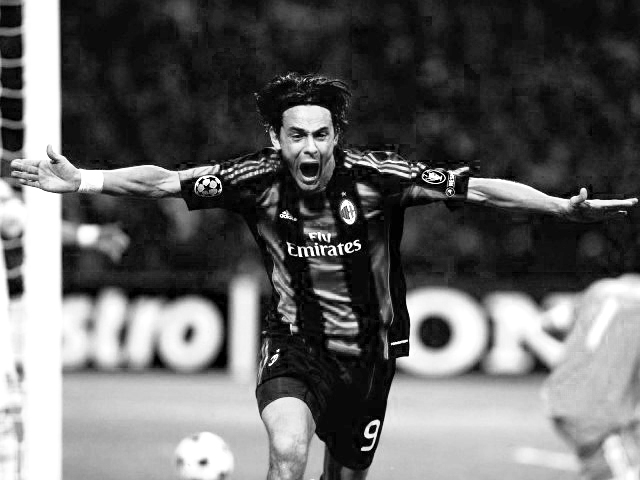
The San Siro erupted as Filippo ‘Pippo’ Inzaghi scored his final goal on May 13, 2012. Coming on as a substitute, he volleyed the ball past goalkeeper Fontana and the Rosseneri started chanting ‘Pippo Inzaghi segna per noi’ (Pippo Inzaghi scores for us). It was the day when one of the greatest strikers in the history of the game bid farewell to his admirers.
It was the typical kiss-the-Milan-badge celebration as the tear-filled moment was the signing out of the Italian’s legendary career. The striker, who scored in every tournament of the game that he played in, was a symbol of consistency for club and country. He made his Serie A debut for Parma, but then moving to Atlanta shortly, he finished the 1996/1997 season as the Capocannoniere (Serie A’s top scorer) with 24 goals scored against every team in the league. That year he was awarded the Young Serie A player-of-the-year award.
It was only a matter of time that a big club took notice. In came the dominant Juventus, who snatched Pippo for around €10 million. What followed was a successful campaign as Juve won the Super Coppa Italiana and the Serie A title in Inzaghi’s first season there. The formidable attack of Allessandro del Piero, Zinedine Zidane and Inzaghi was no doubt one of the most diverse set of skills in attack ever seen in football.

Inzaghi’s pesky ability to annoy the defence was not going unnoticed as the great Sir Alex Ferguson, the then manager of Manchester United said, “Filipo Inzaghi was born in an offside position”. Getting this sort of critique from Ferguson was evident of the growth of Inzaghi as one of the most clinical strikers of that time. He scored 18 league and six Champions League goals that season, but was unable to lead his team to victory as they eventually lost to Real Madrid in the final of the Champions League.
Inzaghi was never too quick for defenders, never had the flare and the brilliance of the Brazilians and yet there was this natural instinct in him of being at the right place at the right time. It was common for someone not to realise during the entire game that Pippo was present at the pitch. It was only when a goal was scored and you saw his name on the score sheet that you realised how big a non-factor he was during the entire game until the telling moment.
David Trezeguet emerged as a viable replacement for Filipo at that time and after four successful years at Juventus, scoring 89 goals in 165 appearances, Inzaghi was sold to rivals AC Milan for a fee of €15m; a definite bargain.
Two years after his move, Inzaghi won his first Champions League title with Milan, as they defeated his old club Juventus on penalties. The bitter-sweet victory sparked the scoring catalyst in the Italian as Pippo recorded a career-high 30 goals in the league next season along with 12 Champions League goals. Pippo was also Italy’s top scorer in their Euro 2004 qualification campaign, but a vicious knee injury in December 2003 almost ruined his career.
Missing out on the Euro 2004 and struggling the entire season, it looked like Inzaghi’s international career was over. But never count out Pippo; he returned to the 2006 World Cup winning squad of Italy and got himself another title to add to his resume.
What made Inzaghi one of the greatest Italian strikers of all time was not the amount of goals he scored, but their timing. A relatively weakened Milan was carried by Kaka the entire 2006-2007 season, who single-handedly won them their round of 16 and semi-final clashes against Celtic and United in the Champions League. But the final called for an Inzaghi performance; Pippo scored twice in the 2-1 win against Liverpool, avenging Milan’s defeat on penalties against The Reds two years ago and adding another Champions League title to his tally.
Inzaghi became the first striker to score in all international club competitions that he played in, after he scored twice against Boca Juniors during the FIFA Club World Cup final in 2007. Pippo declared his retirement after a legendary Milan career, which consisted of 126 goals in 300 matches.
Ha has captured almost every major trophy in the game — two Champions Leagues, three Scudetti, one Club World Cup, one Coppa Italia, one UEFA European Under-21 Football Championship and one World Cup. Pippo bagged a final award to round off his illustrious career when he was privileged with the life time achievement award at Grand Gala Del Calcio 2013.
The Inzaghi that every football fan should cherish, celebrated each and every goal the same way, with the same enthusiasm and jubilance. The only reason he was on the pitch was to score. Pippo’s legacy might be forgotten by many football fans who have not seen him perform, but those who have witnessed Inzaghi’s insticts in an all-important match, will be witness to his greatness.
For the complete Hall of Fame series, log on here.
Published in The Express Tribune, May 2nd, 2014.
Like Sports on Facebook, follow @ETribuneSports on Twitter to stay informed and join in the conversation.
COMMENTS (1)
Comments are moderated and generally will be posted if they are on-topic and not abusive.
For more information, please see our Comments FAQ

1725612926-0/Tribune-Pic-(8)1725612926-0-165x106.webp)








1732177276-0/Copy-of-Untitled-(62)1732177276-0-270x192.webp)






If we look at it from the same dimension, I believe Javier Hernandez (Chicharito) has the same instincts. He's not a great dribbler, doesn't fire past shots from 30 yards out but he is always in the position from where it's a tap in or a free header. However, Hernandez hasn't been able to achieve what Inzaghi has but I think if he gets regular at Manchester United, he would be scoring much more important goals.